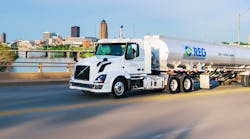Climate change may remain a source of debate in some circles, but there’s no denying that for commercial and public fleets, the motivation for reducing carbon emissions has never been higher.
For many fleet operators, that comes from a desire to do good. For others, it might be the result of external pressure, such as government regulations or customers’ sustainability requirements.
Regardless of their reasoning, how they go about reducing their emissions must make economic sense for their operations. A sustainability plan that hurts their financial goals risks undermining the strength of their organization, which could jeopardize environmental goals.
That’s what makes biodiesel so intriguing. Its benefits include:
- Competitive pricing
- Help with total cost of ownership
- Ease of transition
- Effective at reducing greenhouse gas (GHG) emissions
Biodiesel vs. diesel price
After labor costs, fuel is often the second-highest expense for fleets. Alternative fuels have a reputation for being more expensive than petroleum diesel, but that’s not always the case. Biodiesel, for example, is often competitively priced against petroleum diesel.
Many fleets run on a blend of biodiesel and petroleum diesel, and, in 2020, the U.S. Department of Energy reported that the average retail price nationally for B20 (a fuel that is 20% biodiesel and 80% diesel) was 25 cents per gallon less than diesel.
Total cost of ownership
The price of fuel is important, but fleets should also consider its broader effect on total cost of ownership (TCO).
- Biodiesel’s increased lubricity compared with petroleum diesel can help reduce excessive wear and even damage to fuel injectors and pumps.
- Biodiesel has a higher Cetane specification than diesel. Higher Cetane equates to a shorter ignition time, which allows for more complete combustion and a more efficient engine.
- Biodiesel’s cleaner burn sends less particulate matter to diesel particulate filters, which can help reduce clogging, regenerations and wear to the component.
Ease of integration
The ease of transitioning to an alternative fuel is another consideration for fleets. Some options require major upgrades or even all new equipment. That may make sense in some instances — and Renewable Energy Group is an advocate for an integrated energy management approach that explores multiple alternative fuels — but in terms of scalability, it’s hard to beat biodiesel.
Biodiesel can be used in existing diesel equipment. Biodiesel blends, like B20, are a true drop-in replacement to petroleum diesel: no modifications are required. Diesel trucks can even run on B100 with only minor modifications.
"With biodiesel, you can start being cleaner and saving money right away without having to do any equipment or infrastructure changes," said Ruan Transportation in this case study.
Infrastructure and supply are other issues fleets need to consider when weighing which fuel to use. With biodiesel, there’s no fueling infrastructure that needs to be built out. Public and private fueling locations can use their existing equipment to offer biodiesel.
There’s also plentiful supply. In fact, the U.S. biodiesel industry can ramp up its production even more: According to the Energy Information Administration, in 2019, the U.S. consumed 1.8 billion gallons of biodiesel and had an annual production capacity of 2.5 billion gallons.
Carbon emissions
Finally, biodiesel delivers on the environmental front. Biodiesel.org says the fuel’s lifecycle GHG emissions are up to 86% lower than petroleum diesel’s. REG’s best-in-class biodiesel does even more, both against diesel and other fuels:*
- 88% less carbon than ultra-low sulfur diesel (ULSD)
- 85% less carbon than compressed natural gas (CNG)
- 65% less carbon than an electric vehicle on the U.S. grid average
- 42% less carbon than an electric vehicle on the California grid average
Fleets that use biodiesel know they can reduce their carbon footprint. They also know they can do it immediately and in a cost-effective manner. To learn more, contact us at (844) 405-0160 or [email protected].
About REG
Renewable Energy Group (REG) is an international producer of cleaner fuels and North America’s largest producer of biodiesel. REG solutions are alternatives to petroleum diesel and produce significantly lower carbon emissions while allowing customers to continue to use their existing equipment. Learn more at regi.com.
*Used cooking oil biodiesel from REG Albert Lea biorefinery; carbon reduction based on lifecycle analysis based on CA-GREET 3.0; utilized EV EER of 5.0 for heavy-duty vehicles.



